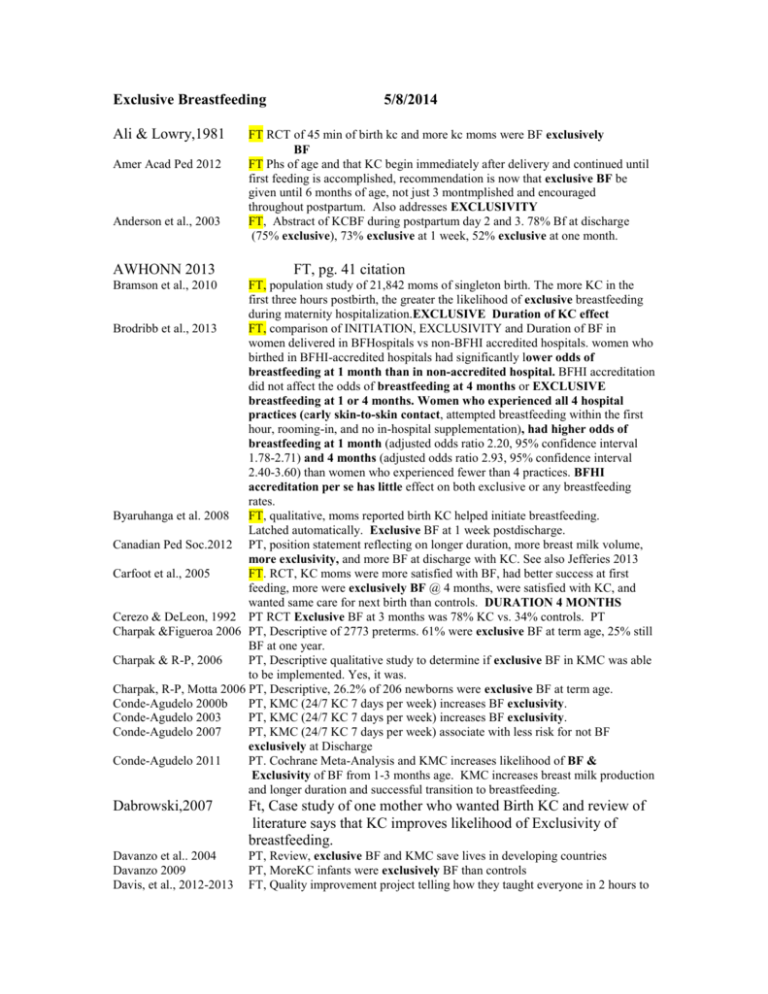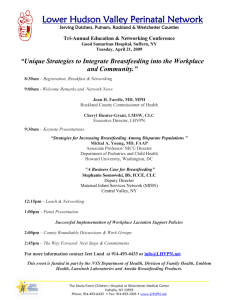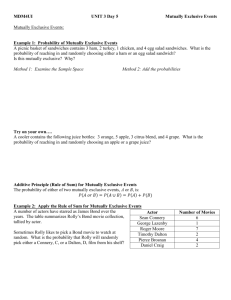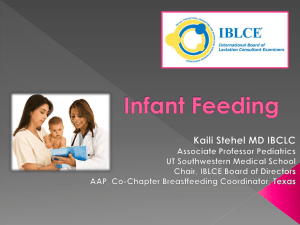Breastfeeding exclusive
advertisement

Exclusive Breastfeeding Ali & Lowry,1981 Amer Acad Ped 2012 Anderson et al., 2003 AWHONN 2013 5/8/2014 FT RCT of 45 min of birth kc and more kc moms were BF exclusively BF FT Phs of age and that KC begin immediately after delivery and continued until first feeding is accomplished, recommendation is now that exclusive BF be given until 6 months of age, not just 3 montmplished and encouraged throughout postpartum. Also addresses EXCLUSIVITY FT, Abstract of KCBF during postpartum day 2 and 3. 78% Bf at discharge (75% exclusive), 73% exclusive at 1 week, 52% exclusive at one month. FT, pg. 41 citation Bramson et al., 2010 FT, population study of 21,842 moms of singleton birth. The more KC in the first three hours postbirth, the greater the likelihood of exclusive breastfeeding during maternity hospitalization.EXCLUSIVE Duration of KC effect Brodribb et al., 2013 FT, comparison of INITIATION, EXCLUSIVITY and Duration of BF in women delivered in BFHospitals vs non-BFHI accredited hospitals. women who birthed in BFHI-accredited hospitals had significantly lower odds of breastfeeding at 1 month than in non-accredited hospital. BFHI accreditation did not affect the odds of breastfeeding at 4 months or EXCLUSIVE breastfeeding at 1 or 4 months. Women who experienced all 4 hospital practices (early skin-to-skin contact, attempted breastfeeding within the first hour, rooming-in, and no in-hospital supplementation), had higher odds of breastfeeding at 1 month (adjusted odds ratio 2.20, 95% confidence interval 1.78-2.71) and 4 months (adjusted odds ratio 2.93, 95% confidence interval 2.40-3.60) than women who experienced fewer than 4 practices. BFHI accreditation per se has little effect on both exclusive or any breastfeeding rates. Byaruhanga et al. 2008 FT, qualitative, moms reported birth KC helped initiate breastfeeding. Latched automatically. Exclusive BF at 1 week postdischarge. Canadian Ped Soc.2012 PT, position statement reflecting on longer duration, more breast milk volume, more exclusivity, and more BF at discharge with KC. See also Jefferies 2013 Carfoot et al., 2005 FT. RCT, KC moms were more satisfied with BF, had better success at first feeding, more were exclusively BF @ 4 months, were satisfied with KC, and wanted same care for next birth than controls. DURATION 4 MONTHS Cerezo & DeLeon, 1992 PT RCT Exclusive BF at 3 months was 78% KC vs. 34% controls. PT Charpak &Figueroa 2006 PT, Descriptive of 2773 preterms. 61% were exclusive BF at term age, 25% still BF at one year. Charpak & R-P, 2006 PT, Descriptive qualitative study to determine if exclusive BF in KMC was able to be implemented. Yes, it was. Charpak, R-P, Motta 2006 PT, Descriptive, 26.2% of 206 newborns were exclusive BF at term age. Conde-Agudelo 2000b PT, KMC (24/7 KC 7 days per week) increases BF exclusivity. Conde-Agudelo 2003 PT, KMC (24/7 KC 7 days per week) increases BF exclusivity. Conde-Agudelo 2007 PT, KMC (24/7 KC 7 days per week) associate with less risk for not BF exclusively at Discharge Conde-Agudelo 2011 PT. Cochrane Meta-Analysis and KMC increases likelihood of BF & Exclusivity of BF from 1-3 months age. KMC increases breast milk production and longer duration and successful transition to breastfeeding. Dabrowski,2007 Ft, Case study of one mother who wanted Birth KC and review of literature says that KC improves likelihood of Exclusivity of breastfeeding. Davanzo et al.. 2004 Davanzo 2009 Davis, et al., 2012-2013 PT, Review, exclusive BF and KMC save lives in developing countries PT, MoreKC infants were exclusively BF than controls FT, Quality improvement project telling how they taught everyone in 2 hours to De Almeida et al., 2010 De Aranjo et al. 2010 Declercq et al.,2008 DiFrisco et al., 2011 Filho et al., 2008 Gathwala et al., 2010 Gupta et al., 2007 Hake-Brooks et al. 2008 Heidarzadeh et al, 2013 improve their exclusive BF rate. Has test questions and benefits of exclusive BF in article and process followed. PT, RCT, 23 in each group, More moms exclusively bf at discharge, term age, &3 months (but not at 6 months) in KC group. PT, descriptive of KMC at home and 86.7 % of infants were exclusively breastfed when getting 5-6 hours of KC/day FT, survey of mothers, KC was significantly associated with success in exclusively BF, as were no supplementation, no pacifiers, and good nursing support for BF. FT, descriptive study of 113 women, 87.5 were BF, 59/2% exclusively BF at 24 wks post discharge and moms who BF in first hour were more likely to be exclusively BF than moms who did not BF in first Hour (see Bramson too) PT, Clin eval of 8 units with KC in step down and 8 units without KC. Higher % of infants exclusively BF at 36 weeks corrected age in KC unit. PT,Late Preterm RCT. at 3 months 88% of KC were EXCLUSIVELY breastfeeding and 72% of controls were (p<.05). PT, got 4-6 hrs KC per day in hospital from when stable til discharged; all were BF in hospital and 8 weeks later 20/50 moms were still doing KC and 16/50 infants were EXCLUSIVELY Breastfed and KC helped milk production. SUPPLY PT, RCT KC got Mean 4.47 hrs KC/day, controls held swaddled. RMANOVA Showed longer duration of BF in KCers and more exclusive BF at 6 months (stat Significance) and more exclusive BF at each time in KCers (clinical Significance only). EXCLUSIVITY PT, 157(62.5%) KMC moms versus 94 (37.5%) in conventional care. KMC group exclusive breast feeding was 98 (62.5%) vs. 34 (37.5%) P =.00 in CMC group, at discharge. Doing KC & gestational age were the only factors predicting exclusive breastfeeding. A 4.1 time increase in exclusive Hung & Berg, 2011 Magri et al., 2013 Maia et al., 2011 Preer et al., 2013 FT, Quality improvement project using PDSA model to increase breastfeeding among 12 NY hospitals that joined together to call themselves the NY State Breastfeeding Quality Improvement in Hospitals Learning Collaborative. Doing the project increased EXCLUSIVE breastfeeding from 6% to 44%.. “Skin-to-skin contact and successful latch to the breast by the newborn during the first hours after birth influence a mother’s ability to breastfeed successfully First thing they had to do was start birth KC. FT. 702 infant records from 6 months before and 6 months after delayed bathing followed by immediate KC from 2.4 hours of age to 13.0 hours of aged increased likelihood of BF initiation by 166% and EXCLUSIVE BF increased from 32.7-40.2%. KC was done after the bath. US Breastfeeding Comm2013 Exclusivity of Breastfeeding Ali & Lowry, 1981 FT RCT of 45 min of birth kc and more kc moms were BF exclusively Amer Acad Ped 2012 FT PT, recommendation is now that exclusive BF be given until 6 months of age, not just 3 months of age and that KC begin immediately after delivery and continued until first feeding is accomplished and encouraged throughout postpartum. Also addresses EXCLUSIVITY Anderson et al., 2003 FT, Abstract of KCBF during postpartum day 2 and 3. 78% Bf at discharge (75% exclusive), 73% exclusive at 1 week, 52% exclusive at one month Rao et al., 2008 PT (FT with SGA), RCT. More 13.4 hjours/day of KC babies were EXCLUSIVELY Breastfed than controls. Suman et al., 2008 Srivastata eta l. 2014 PT, FT (SGA) RCT. more 24/7 KMCers were exclusively BF than controls FT, RCT of Birth KC that showed more infants BF and EXCLUSIVELY BF at discharge and 6 weeks post birth and better sucking competence.



